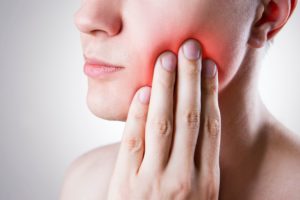About one-fifth of dental patients have a habit of grinding or clenching their teeth. This behavior often occurs unconsciously, such as while sleeping, so many people do not realize they do it. But if it continues, the grating of the top teeth against the bottom teeth can lead to dire consequences for your dental health.
If you understand how bruxism can hurt your smile, you may be more inclined to seek treatment for this habit from your dentist. Read on to learn about three oral health risks that stem from chronic teeth grinding.

Why Treat Teeth Grinding Habits?
Prevent Tooth Breakage
Your teeth are built to endure wear and tear from chewing and biting regularly. But teeth are not indestructible. Under high amounts of pressure, teeth might crack, chip, or fracture.
This tooth breakage can disrupt the appearance of your smile. But it also creates a vulnerable spot in your tooth that will allow bacteria to penetrate and hurt your dental structure.
This injury will deepen without urgent restorative dental treatment from your dentist. But you can prevent this dental emergency by stopping teeth grinding habits that can create this type of pressure that will hurt your tooth. Schedule an appointment with your dentist to find a solution that suits your unique dental needs.
Decrease Risk of Tooth Decay
As mentioned, constant teeth grinding can damage your enamel, the outer layer of your tooth. But it can gradually wear down this hard shell, eroding it in a different way than tooth breakage. This still weakens your dental health, heightening your risk of dental dangers like tooth decay.
A dentist can treat early stages of decay, cavities, fairly easily. But you should preserve the natural structure of your teeth as much as possible. Once gone, your enamel will not regrow.
You can preserve your smile by treating bruxism with help from your dentist. They can do this by helping you reduce stress, amend bite problems, and other treatment options.
Protect Jaw from TMJ
If you grind your teeth, the pressure of this behavior will extend beyond your teeth and to your jaw. It puts strain on the muscles and tendons that can generate pain when you move your jaw. Over time, this can lead to temporomandibular joint disorders, also known as TMJ.
With TMJ, you might notice pain radiating to your head and ears as well as difficulty performing oral functions with the jaw. Your dentist can treat TMJ and teeth grinding with a custom-made night guard.
You can wear this appliance during sleep to keep the jaw in a position of rest that reduces strain on the jaw joint. The night guard also cushions teeth against pressure from grinding or clenching that can occur as you sleep. This will lower your risk of forming TMJ and other oral health complications related to bruxism. Learn more by calling your dentist in Suffolk, VA today.

